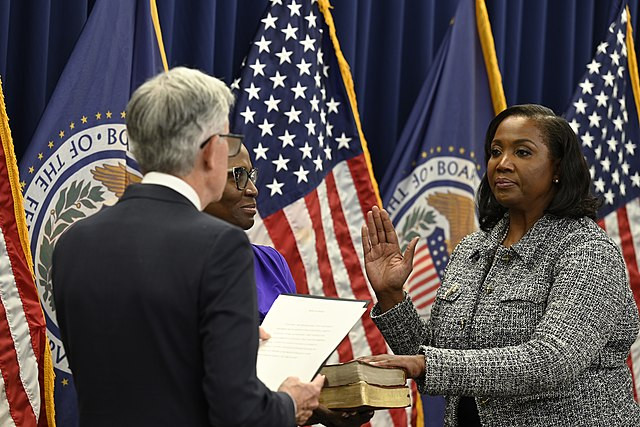Federal Reserve Governor Lisa Cook plans to sue President Donald Trump in an effort to keep her seat on the central bank's board after the White House announced she was being fired, setting up a potentially historic legal showdown over the Fed's independence.
"His attempt to fire her, based solely on a referral letter, lacks any factual or legal basis. We will be filing a lawsuit challenging this illegal action," Cook's attorney, Abbe Lowell, said Tuesday. Cook, the first Black woman to serve on the Federal Reserve's governing board, has vowed to remain in her post until her term expires in 2038.
Trump on Monday said he had "sufficient cause" to dismiss Cook, citing mortgage documents from 2021 in which she listed two separate properties in Michigan and Georgia as primary residences. "At a minimum, the conduct at issue exhibits the sort of negligence in financial transactions that calls into question your competence and trustworthiness as a financial regulator," Trump wrote in a letter. He accused Cook of "deceitful and criminal conduct in a financial matter."
Cook responded hours later that "no causes exist under the law, and he has no authority" to remove her from office. She was appointed to the Fed in 2022 by then-President Joe Biden and confirmed by the Senate.
The move marks the first time a sitting president has attempted to remove a Federal Reserve governor under the "for cause" provision of the Federal Reserve Act of 1913. Legal experts say the case could test both the meaning of "for cause" removal and the limits of executive power over the central bank, which has long operated with political independence. Peter Conti-Brown, a Fed historian at the University of Pennsylvania, noted the mortgage transactions were public before Cook's confirmation. "To reach back and say these things now constitute fireable offenses is incongruous with the entire concept of 'for cause' removal," he said.
Financial markets reacted cautiously. On Tuesday, Wall Street equities were largely flat, but Treasury yields shifted: two-, five- and ten-year notes fell, reflecting expectations of a potential rate cut, while yields on longer-dated bonds rose, suggesting concern over the Fed's inflation-fighting credibility. The dollar weakened against major currencies.
The Supreme Court may ultimately decide the dispute. In Trump v. Wilcox last year, the Court suggested the president could not remove Fed governors, describing the central bank as "a uniquely structured, quasi-private entity that follows in the distinct historical tradition of the First and Second Banks of the United States." Analysts expect Cook v. Trump to land before the Court if the case proceeds.
"The Fed as an institution escaped harm in the first Trump administration, and will not be so fortunate this time around," said Tim Duy, chief U.S. economist at SGH Macro Advisors. "It's another reason to believe that rates will be lower than would otherwise be the case."






